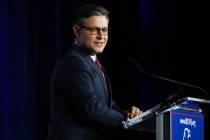Nevada can blaze trail on daily fantasy, eSports
When the Nevada Gaming Control Board determined in October that daily fantasy sports companies must be licensed to operate in the Silver State, many observers falsely presumed that the casino gaming industry was flexing its muscle to shut down an upstart competitor. In actuality, Nevada provided legal clarity and a roadmap for daily fantasy sports’ continued success — exactly what the gaming industry is seeking across the United States.
Our industry is also seeking a greater focus on the intersection of regulation and innovation, two critical components of gaming that are often at odds. Gov. Brian Sandoval appreciates this challenge, and we applaud him for convening the Nevada Gaming Policy Committee for a meeting today to determine how Nevada can lead the way in regulating DFS and other important disruptors to the traditional gaming product.
DFS is a compelling upstart business caught in a legal gray area between state and federal laws. With billions of dollars changing hands and thousands of participants, DFS is also an industry in need of consumer protections and other regulations that ensure the integrity of its product.
But DFS is not the only one caught in a legal gray area — so too are the casinos that might wish to do business, such as hosting events or sponsoring activities with these innovative new companies. Over the past year, gaming regulators across the country have warned casinos to steer clear of DFS, lest we risk our multibillion dollar privileged licenses. Yet how are gaming companies supposed to stay ahead of the curve of consumer demand — which DraftKings and FanDuel have clearly tapped into — by sitting on the sidelines?
Even the majority of professional sports leagues, which have long opposed anything that toed the line of gambling, have not only embraced but invested in DFS. In the NFL alone, 28 of 32 teams entered into business relationships with DFS companies.
Removing DFS from the legal gray zone and establishing a regulatory structure is critical to the casino gaming industry’s business relationship with DFS companies.
But make no mistake: what our industry is confronting is bigger than DFS. ESports, in which professional video game players compete in front of thousands of fans, many of whom bet on the outcome, is another example of a potentially disruptive concept that is gaining steam. In April, the League of Legends spring champion will be crowned at Mandalay Bay Events Center — the first time the event has been held outside of Los Angeles. A previous match at Madison Square Garden was viewed by more than 11,000 fans. And a Chinese gaming company wants to build an eSports arena on the Strip.
Two guiding concepts could help with navigating this new terrain and maintaining Nevada’s historic role in setting the gold standard for gaming regulation.
First is the need to enable innovation. Can revolutionary gaming innovations happen in a heavily regulated marketplace? Evidence suggests that the unregulated market — birthplace to disruptors such as DFS and eSports — is a type of testing lab. As disruptive new platforms take hold in the marketplace, regulations should aim to integrate them into our industry without pushing the customer down the path of least resistance to the unregulated, illegal market.
Second, regulations should be flexible. In gaming’s early days, casinos competed against the new building across the street. Later, casinos fought for customers with casinos in a neighboring state. Now, as gaming operates in 80 percent of the United States, casinos are competing against every other entertainment option. Regulatory flexibility will allow operators and manufacturers to rapidly adapt to changing consumer trends and help to ensure a thriving gaming industry, which states count on for significant tax revenues.
And just like gaming operators and suppliers, regulators need to be nimble to keep pace with emerging technologies, shifting demographics and changing market demands. Otherwise, rules become obsolete before they are even implemented.
Through the work of the Nevada Gaming Policy Committee, the leadership of Gov. Sandoval and the collaboration of gaming companies and regulators, Nevada can send a message that it will continue to be the gold standard in gaming innovation.
Geoff Freeman is president and CEO of the American Gaming Association.























